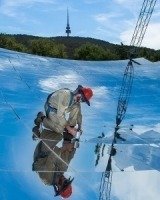Innovation, Science, and Business

Abstract
The latest ANUpoll has found a large majority of Australians support science and want politicians to rely more on the advice of scientists and experts.
The ANUpoll also found 67 per cent of those surveyed believe science is best funded by government rather than private business, while 82 per cent believe politicians should rely more on expert scientific advice.
Lead researcher Dr Jill Sheppard said the poll, conducted by The Australian National University, also found 94 per cent of those surveyed believe scientists and industry should cooperate more with each other.
“At a time when science is at the centre of some of the major policy debates, such as climate change and energy security, the ANUpoll finds people want the policy makers to listen to and take advice from scientific experts,” said Dr Sheppard, from the ANU School of Politics and International Relations.
“The findings show Australians are also looking for scientists to help them sort facts from fiction in the modern world of fake news and so called alternative facts.”
Innovation, Science, and Business: Australian Attitudes to Government Support (314K PDF) is No. 23 in the ANUpoll series.
Key findings
The poll surveyed 1,202 people by phone and was conducted by the Social Research Centre – an ANU Enterprise business.
It found:
- 75 per cent believe the benefits of technology outweigh the risks;
- 51 per cent believe Australia’s scientific achievements are above average on the world stage;
- 84 per cent believe more people should be working in research and technological development in Australia;
- 68 per cent are more excited than concerned about new technology;
- 45 per cent believe technological change is too fast, increasing to 74 per cent among those with a year 10 education or less;
- Around 60 per cent believe farmers are more worthy of government assistance than technology entrepreneurs; and
- 57 per cent would support government assistance to a medical research company developing an anti-malaria drug.
Lead researcher Professor Matthew Gray, from the ANU Centre for Social Research and Methods, said the ANUpoll provided a snapshot of Australian attitudes at a time when spending on Research and Development (R&D) was falling to around 2.1 per cent of GDP and below the OECD average of 2.4 per cent of GDP, and with private sector investment well below other nations.
“In Australia a smaller proportion of expenditure on R&D is contributed by the private sector compared to other OECD countries,” Professor Gray said.
“The figure for Australia in 2013 was 56.3 per cent compared to an OECD average of 81.1 per cent, and well below the United States (70.6 per cent), Japan (76.1 per cent) and Germany (7.2 percent).
“The relatively low proportion of Australian R&D being undertaken by the private sector is one of the reasons for successive governments attempting to increase private sector R&D expenditure.”
ANU Vice-Chancellor Professor Brian Schmidt launched the poll and said he was encouraged by the results.
“As a scientist, I am particularly heartened by the Australian public’s strong support for Australian science and innovation that this poll reveals,” Professor Schmidt said.
“I am also excited that most Australians recognise the importance of scientific research in Australia and their views that our political class should take heed of such research.”
About the poll
ANUpoll is conducted for The Australian National University (ANU) by the Social Research Centre, an ANU Enterprise business. The poll is a national random sample of the adult population, and is conducted by telephone. In this poll, 1,202 people were interviewed between 24 October and 8 November 2016 with a response rate of 19.8 per cent. The results have been weighted to represent the national population. The poll’s margin of error is ± 2.5 per cent.








